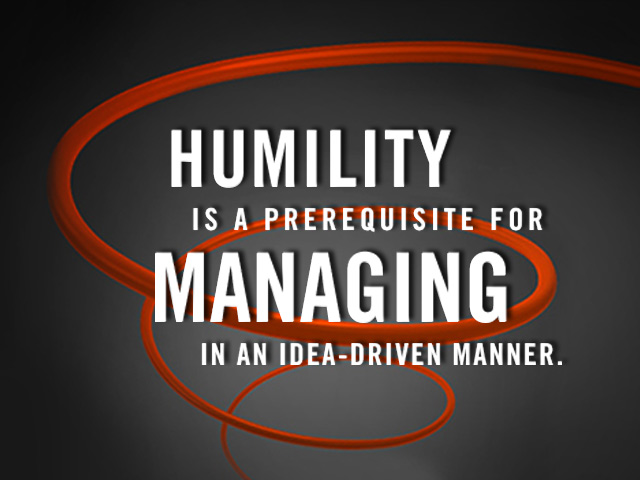We recently asked the leaders of two idea-driven companies what was the most important characteristic they looked for when hiring or promoting managers. Their surprising answer: Humility.
Inditex, best known for its Zara brand of “fast-fashion” stores, is headquartered in A Coruna, Spain, and is the world’s largest clothing company with over 6,000 stores in 70 countries. Zara’s business model is built around closely listening to customers and rapidly acting on the resulting information. It relies on its sales associates to observe what fashion-conscious customers are wearing and to listen to what they are requesting. Amancio Ortega, company founder, is the third richest man in the world.
We asked Jesus Echevarria, Chief Communications Officer, what characteristics his company looked for in its managers. “First of all, humility,” he said. “A manager has to have the humility to listen to and respect other people’s ideas if he expects to rise up in Inditex.” Humble managers are necessary for business model that is based on listening. (Afterward, we realized that Echevarria never did offer a second characteristic!)
Jay Reardon was the architect of Hickory Chair’s remarkable turnaround from near bankruptcy. Under his tenure, except for the 2008 recession, annual sales grew at double-digit rates, and profit margins increased while prices were held steady. Hickory’s return on assets (ROA) increased to almost fifty percent.
Reardon did all this by building an organization capable to tapping extraordinary numbers of ideas from its front-line people. He, too, was very clear to us about what he looked for when hiring or promoting managers:
First, I look for people who are humble. Humility is not a weakness—it is a strength. I am careful to do the background work to make certain a candidate will be truly humble. How does he talk about his co-workers? How do they talk about him? Is he in the background supporting others and celebrating their accomplishments, or is he standing out front demanding all the attention?
To understand why idea-driven organizations prize humility in their managers, think about the opposite of humility: Arrogance. From the point of view of ideas, when a person is arrogant — meaning that they see themselves as better than others — they cannot take in information and not open to ideas from other, particularly their subordinates. Not a good person to have around in an idea-driven organization!


